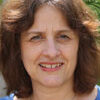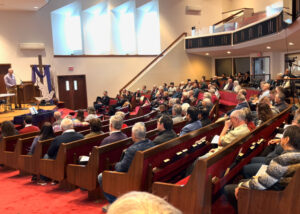With the theme of “Stuck Together,” delegates from all 23 congregations rejoiced together, wrestled with a budget deficit and welcomed a new church plant at the 2024 Mennonite Church B.C. annual meeting.
Prayers were offered throughout the day in various languages spoken in MCBC congregations: Spanish, German, Hmong, Korean, Japanese, Vietnamese and Chinese. The meeting took place February 24 at Emmanuel Mennonite Church in Abbotsford.
A presentation titled “The Big Challenge is to Listen Well,” by J. Nelson Kraybill of Elkhart, Indiana, began the morning plenary session. “Most of society has lost the will to listen,” said the former head of Anabaptist Mennonite Biblical Seminary, explaining that the tribal tendency to affiliate almost exclusively with our own kind is a danger in society.
Urging people to listen to those with other views, Kraybill said, “It might change us!”
During the business session, delegates approved a motion related to the Peardonville property, the site of the former Clearbrook Mennonite Church, which closed in 2015. The property was sold last year for $6 million. Delegates decided that 10 percent of the sale proceeds will go into a fund for the Indigenous Relations Task Group, another 10 percent will go into a fund for MCBC leadership and the remaining 80 percent into a fund “to support starting new congregations, revitalization, service, peace and justice initiatives and leadership training in individual congregations.” Camp Squeah is included alongside congregations in this case.
This will be revisited in three years.
The proposed 2024 budget was approved, including funds for a new youth director position and $260,000 for church revitalization and church plant projects.
It was noted that even with the Peardonville funds covering the expenses noted above, the resulting net deficit is $121,417. This amount will be withdrawn from unrestricted reserves.
Some people emphasized the need to address structural deficits so that MCBC can be a denomination for the future, not just the present and the past. Steve Unger, a member of the Finance Committee, admitted that, “It’s been a difficult budget to work with. I don’t like to spend the money, but we’re Canadians and we live with deficit.”
Tim Miller, MCBC finance chair, noted that the deficit was not sustainable. “If, after the next two years, our income levels do not improve and the budget deficits persist, MCBC will need to relook at staffing and program costs,” he said.
Other matters of note from the sessions included the following.
Jordan Pilgrim, pastor of Valley Road Church in Kelowna, gave a video report describing the new church plant as “moving forward with the Anabaptist vision” in that city. The congregation began meeting in January and has attracted many people, including young families, who live in the neighbourhood. Approximately 50 people attend.
It was announced that MCBC’s young adults are holding a gathering at Camp Squeah in June. The theme is “Faith, Activism and Church: Building an Active Future.”
Steve Brown was introduced as the new president of Columbia Bible College, which is jointly owned by MCBC and the Mennonite Brethren conference.
This was the first MCBC AGM that Shel Boese, executive minister since last August, had attended. In his remarks, Boese reminded the audience: “You do not exist for the regional church; the regional church exists for you. We are called to be focussed on who Christ is, the one thing that can hold us together.”
Highlights of the past year included Yarrow United Mennonite celebrating its 85th anniversary and Eben-Ezer celebrating its 60th.
In addition to Boese, two other new staff were hired: John Willms as half-time youth director, and Keith St. Jean as communications coordinator.
The previous day, Nelson Kraybill spoke at the LEAD sessions. The theme, “Stuck Together: The Hope of Christian Witness in a Polarized World,” was based on his recently published book of the same name. Kraybill engaged the audience with Bible passages and personal anecdotes on the theme of lovingly engaging with those of opposing beliefs.
Speaking on the value of differing beliefs, Kraybill said, “Where everybody thinks alike, nobody thinks very much. I want a church with both liberal and conservative people in it. If we have only conservative, we have brakes and no accelerator. If we are only liberal, we end up with accelerator and no brakes.”
He added that it is natural to want to associate with people like us, but the negative side is that “we become destructive; we diminish or disparage other people.”
In later sessions, Kraybill pointed out polarization in Jesus’ time, when most Jews did not accept Jewish Christians, and neither group accepted Gentiles. In this climate, Jesus reached across boundaries and ministered in love, associating with people whose life choices he did not condone.







Leave a Reply
You must be logged in to post a comment.